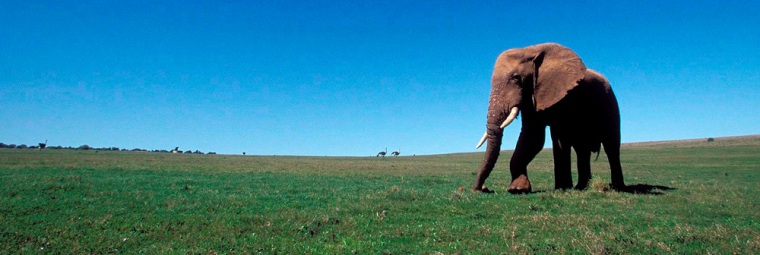South Africa said Monday that it will start killing elephants to reduce their burgeoning numbers, ending a 13-year ban and possibly setting a precedent for other African nations.
Environment Minister Marthinus van Schalkwyk said the government was left with no choice but to reintroduce killing elephants "as a last option and under very strict conditions" to reduce environmental degradation and rising conflicts with humans.
There will be no "wholesale slaughter," he told reporters.
The announcement follows months of impassioned debate, with some conservationists arguing for elephant killings to protect the ecosystem, and animal welfare groups outraged at the prospect of slaughtering one of the planet's most intelligent and self-aware creatures.
South Africa has been hugely successful in protecting its elephant population, once on the verge of extinction in parts of the country. But it has become a victim of its own success. The number of elephants, which have no natural predators other than humans, is growing at a rate of more than 5 percent a year and is expected to double by 2020.
The decades of the big white hunter in the 1800s brought Africa's elephants near to extinction. South Africa had just 200 elephants at the beginning of the 20th century.
Now South Africa, Namibia and Botswana all have booming populations as a result of their conservation efforts, while those of east and west African nations are struggling because of large-scale poaching.
South Africa has about 18,000 elephants and southern Africa is home to about 300,000 — half of all the elephants on the continent.
More clashes with people
Elephants can turn woodlands to grass and stubs in a matter of years. They need to roam widely to get their daily diet of about 660 pounds of grass, leaves and twigs and up to 52 gallons of water. And they increasingly clash with people.
"Our simple reality is that elephant population density has risen so much in some southern African countries that there is concern about impacts on the landscape, the viability of other species and the livelihoods and safety of people living within elephant ranges," van Schalkwyk said.
South Africa, Namibia, Zimbabwe and Botswana, which has 165,000 elephants — more than any other country — all used to kill elephants before international outrage forced an end to the scenes of game rangers rounding up and shooting trumpeting, frightened herds.
South Africa remains fearful of upsetting tourists who flock to see the Big Five animals — elephant, lion, rhino, leopard and buffalo.
Van Schalkwyk said the debate was marked by "strong emotions."
"There are few other creatures on earth that have the ability of elephants to 'connect' with humans in a very special way," he said.
Michele Pickover, a spokeswoman for Animal Rights Africa, which is threatening to promote tourist boycotts, said killing elephants was "undeniably cruel and morally reprehensible."
She said South Africa does not have too many elephants and that the decision by the government posed a threat to the elephant population in southern Africa.
"South Africa has opened the door to en masse killing of elephants," she said.
But the World Wildlife Fund cautiously welcomed the government's move.
"They are doing the responsible thing," said Rob Little, acting chief executive of WWF South Africa. "It is the right choice to have culling as an option but with strong provisos."
South Africa's new regulations on managing elephants, effective May 1, say killing must be through "quick and humane methods," preferably by a single lethal shot to the brain by a marksman in a helicopter.
Van Schalkwyk did not specify how many elephants could be killed or when, except to say that figures of 2,000 to 10,000 being suggested by animal rights groups were "hugely inflated."
Little said neighboring countries were "watching us for guidance" and that he did expect others to follow South Africa's example.
"We all love elephants, no one wants to kill them but we don't have the luxury for one species to dominate," he said.
Bob Scholes, who headed an assessment of elephant management leading up to the rule change, said it was "quite likely" that other countries would follow South Africa's lead and use killing to control elephant populations, even eventually in East Africa, once the numbers there, which have stabilized, begin to increase.
"I see little alternative to doing so," he said.
‘Worth much more alive than dead’
Scholes said elephants brought South Africa $2.42 billion a year from tourism and $148 million in ivory, hunting and sales.
"Elephants are worth much more alive than dead," he said.
Van Schalkwyk also announced that the government is prohibiting the capture of wild elephants for commercial purposes — a move likely to draw fire from a fast-growing industry in elephant-back safaris.
In addition, he said, the government is drawing up regulations to govern treatment of the country's 120 captive elephants. Van Schalkwyk said his department had received "numerous complaints" about cruel training practices including the use of electric prodders.
South Africa said that overall it was trying to manage the needs of elephants with those of people, killing some of the wild animals humanely while eliminating the unnecessary and sometimes cruel treatment of tamed elephants.
